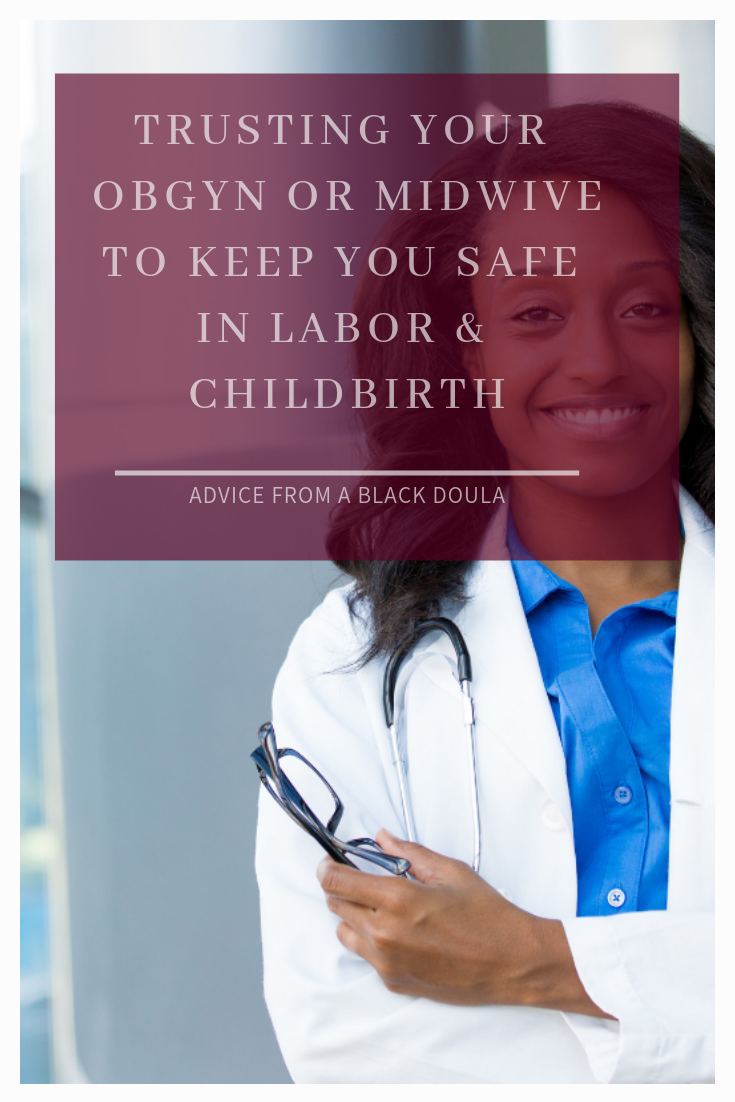When clients call us afraid of childbirth and worried especially about how race may make their pregnancy harder, we do what doulas do- we listen, we affirm, we support. Doulas also educate though, and I want families to know that even though black maternal mortality is not the fault of black women, there are steps we can take to be healthier, happier and empowered. We’re covering them through the rest of this series.
Since we’re talking about health and medical outcomes the first thing we want to discuss is your medical provider.
We simply cannot understate the importance of your medical birth and postpartum team. These are the people charged with keeping you safe throughout your pregnancy, listening to your concerns, and ensuring that you know what to expect while you recover and bring your baby home. If your life needs to be saved, this is who we turn to.
OB/GYNs and midwives, labor and delivery nurses, the hospital, birth center home birth provider that you choose all matter. And in DC, MD, and VA, you do have options.
Did you know that you can interview your maternity care provider?
That’s right, as an informed patient, you have the power to choose your doctor or midwife, and you can ask them questions and do some research about them, to make sure that they’re a good fit.
You’ll find a lot of lists about what to ask OBs and midwives, and we help clients choose a provider that’s a good fit for them as doula. But this is so much bigger than any list.
What you really want to do is to start a dialog with your doctor or midwife, about keeping your safe as a black woman having a baby.
You might say something like:
“I have read and heard a lot about black infant and maternal mortality and I’m worried. I want to talk about my pregnancy and birth, and what we can do.”
Your provider’s reaction will tell you a lot.
Are they uncomfortable with a question about black maternal and infant mortality?
Can they point to training they’ve taken on implicit bias? This is training that can help address the racism that doctors and midwives have unintentionally, that impacts how they treat patients. Has your provider done research into health disparities? Do they have a thought on what the causes are? And most importantly, do they dismiss your concerns?

When you consider your interactions, ask yourself these things:
-
Do you and your healthcare provider share a similar outlook on birth?
Some people approach maternal mortality by being hands off and promoting unmedicated birth, while others want to do more testing during pregnancy, fetal monitoring, and intervening. You get to choose what you’re comfortable with based on your preference and medical history, and your provider should share your values. You should also talk to your provider about hospital policies and if they’re different than what your doctor or midwife wants.
-
What’s your doctor’s, midwives’ and hospital’s track record?
Much of this information can be googled these days. What is patient satisfaction like? Do they have experience to point to address black women’s health and are women of color happy with this provider?
Can they share cesarean rates, episiotomy, induction and vaginal birth after cesarean (VBAC) policies and rates of success? *Also, with these numbers and policies, take into consideration who they’re working with. It’s very different if a midwife often has to transfer their low-risk patient’s care to an OB for a cesarean, than if a maternal fetal medicine specialist regularly performs life-saving surgery.
Also, ask specifically about issues related to black infant and maternal mortality such as pre-eclampsia, postpartum hemorrhage, postpartum depression, and low birth weight. And ask about anything in your own medical history or family history that would be cause for concern.
-
How do you feel when you’re with this provider?
This is critical. Are your racial spidey senses tingling? Do you prefer one midwife or OB in the practice and not the others? Did you feel rushed or dismissed during the conversation? And if something goes wrong, do you trust them?
You should feel safe and listened to. And if it will make you feel safer to have a healthcare provider that shares your racial background, listen to your gut, but know that there’s more to it.
These conversations are hard, but they’re important. We have to talk to healthcare provider and one another, if we’re going to make improvements. As doulas, we’re here to help you through them. Stay tuned to see what’s next in this series.
Be sure to check out our online pregnancy course designed for women of color, Attain.


